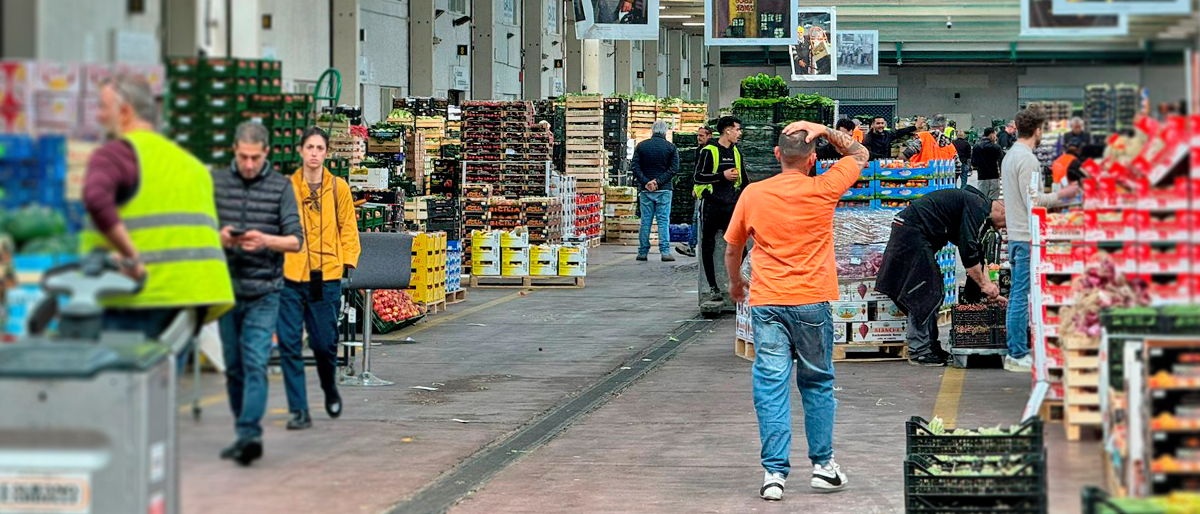Finding new inspiration for the Modernization of Urban Agrilogistics in Morocco, Egypt, Jordan, and Tunisia

Fresh food in the cities
56% of the global population lives in cities, a number that is expected to double by 2050 if current trends continue. Ensuring urban consumers have constant access to safe, fresh affordable foods such as fruit, vegetables, fish, dairy, and meat requires a resilient supply chain that links producers and buyers, enabling business to be conducted transparently and fairly. Wholesale food markets sit at the heart of the urban agrifood chain, at the point where fresh produce is traded.
In Morocco, the Ministry of Agriculture, Maritime Fisheries, Rural Development and Forestry (MOA), is planning to build twelve new-generation fruit and vegetable wholesale food markets by 2030 and invest in making existing ones more sustainable, efficient, and inclusive. This work is supported by FAO’s Investment Centre and the European Bank for Reconstruction and Development (EBRD), who are carrying out assessments of domestic market access for horticulture products and agro-logistic and distribution infrastructure needs in Egypt, Jordan, and Tunisia, as well as Morocco. The project aims to help inform investment and development plans in different national contexts for public and private stakeholders.
From Morocco to Italy
A study tour to visit recently modernized wholesale markets took 14 Moroccan participants including representatives from the MOA, Regional Directors for Agriculture, and MEDZ – a local implementation partner – to Bologna and Rome where they saw and discussed how operations work on the ground in Italy. This was followed by a one-day debrief at FAO headquarters in Rome to identify the opportunities and challenges of adapting good practices to the Moroccan context considering local regulatory frameworks, supply and distribution pathways, and the policy, investment, and operational environment.
“The visits gave us a clearer idea of design, management, and revenue model options including through private and public sector investment and engagement, that stimulate trade and competition between producers and sellers,” explained Naima Moutie, Director of Production Sector Development, Agribusiness Division and Project Director for Wholesale Markets, MOA. “We appreciated the attractive clean open modular spaces where labelled goods including processed and packaged goods were displayed and how this enhances marketing and networking opportunities.”
Challenges and opportunities
Wholesale food markets need to be adapted to local food system governance and coordination mechanisms as well as users’ current and future needs. At the markets in Rome and Bologna, good governance practices incentivize direct contact between producers and buyers, including through a diverse mix of users from organic cooperatives to large private sector retailers. There is also a revenue model that encourages competition and incentivizes trade.
“In Italy, revenue models of wholesale food markets are mainly based on rents from tenants and entrance fees from buyers. In exchange, market authorities deliver ancillary services that support operations such as cleaning, security, waste management, digital pricing information systems, and the enforcement of food safety control by a national agency,” says Florent Tomatis, Agrologistics and Market Expert, FAO Investment Centre. “In Morocco, producers and food operators are obliged to use wholesale food markets where revenue is mainly generated from a fixed tax system of seven percent on the value of agriculture products.”
The tax is collected by agents who are key intermediaries in the Moroccan food distribution system.
“Reducing the number of intermediaries, revisiting the revenue model, and allowing producer cooperatives to be active stakeholders and participate in management decisions are approaches that Morocco is keen to consider,” explains Erifyli Nomikou, Agribusiness Advisory Expert, the EBRD. “These kinds of initiatives, along with opening the markets to more diverse operators including large distributors, can reduce product costs, boost producers’ powers to negotiate and increase transparency”.
Other good practices identified at the debrief include more private sector participation in the development, management, and use of the markets, high-quality product presentation including labelled and packaged products as well as more premium products to encourage marketing and sales. In addition, the importance of improved biosecurity, and the introduction of sustainable practices in construction and operations, such as the bio-methanization of organic waste into biogas, was highlighted along with the need to invest in upstream agrilogistic facilities.
From Italy to Morocco
Similar study tours will be organized by the project for wholesale food market authorities and Ministries of Agriculture in Jordan, Egypt and Tunisia in the next months to support ongoing infrastructure upgrading. This activity is part of a wider scope FAO/EBRD food security project in the Southern and Eastern Mediterranean to assist with short-term emergency responses and build the countries’ long-term resilience to shocks. It will also help countries re-assess their food production potential, looking at climate and environmental constraints and maximizing the value of sustainable local production including through trade diversification.
More on the project activities can be viewed here.
